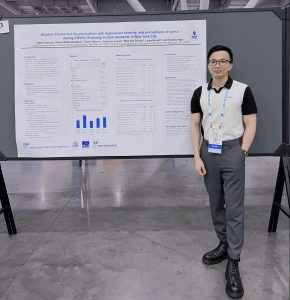A groundbreaking study by CUNY SPH researchers provides valuable insights into the prevalence of substance use, its relationship with depression and the impact of social factors among residents in Harlem during the COVID-19 pandemic.
The study, “Substance Use Patterns and Their Association with Depression and Social Factors during COVID-19 among Harlem Residents in New York City,” was led by doctoral student Thinh Vu, in collaboration with faculty members Pedro Mateu-Gelabert, Deborah Levine, Luisa N. Borrell and Victoria K. Ngo.
In a survey conducted between April and September 2021, over a third of respondents reported using substances and initiating and/or increasing substances both before and during the COVID-19 pandemic. The most common substances used before COVID-19 and initiated/increased during COVID-19 were tobacco, marijuana and e-cigarettes.
The researchers found that residents with mild and moderate symptoms of depression, as well as housing insecurity, had a significantly higher probability of initiating and/or increasing substance use. Conversely, respondents experiencing employment insecurity were less likely to report such patterns. No association was found between substance use initiation and/or increase and food insecurity. The study emphasizes the urgent need to prioritize mental health support and address underlying social circumstances.
“These findings provide a comprehensive understanding of substance use trends and their impacts,” says Vu. “By recognizing the complex interplay between depression, social factors, substance use, and the pandemic, we can develop targeted interventions and culturally sensitive support systems that promote healthier coping strategies during global health crises.”
The researchers hope that the insights gained from this study will inform public health initiatives, policies and interventions to better support mental health and combat substance use challenges in Harlem and other similar communities.
Before this publication, the research team also published a paper entitled “Alcohol misuse, binge drinking, and their association with depression severity and perceptions of police during COVID-19 among Harlem residents in New York City” in the Journal of Urban Health.
Funding for this research was generously provided by the City University of New York Interdisciplinary Research Grant (IRG 2841), the NIH Transformative Research to Address Health Disparities & Advance Health Equity Initiative (U01OD033245), and the Robert Wood Johnson Foundation Systems for Action (RWJF 79174) (PI: Prof. Victoria K. Ngo). This study used the resident need assessment data from the Stepped-Wedge Randomized Controlled Trial with Supplement entitled “Harlem Strong Mental Health Coalition: A Multi-sector Community-Engaged Collaborative for System Transformation.”




